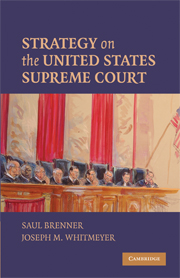Book contents
- Frontmatter
- Contents
- Preface
- PART I INTRODUCTION
- PART II CERTIORARI
- 4 The Losing Litigant Model
- 5 The Outcome-Prediction Strategy
- PART III THE CONFERENCE VOTE ON THE MERITS
- PART IV THE MAJORITY OPINION AND OTHER OPINIONS
- PART V THE FINAL VOTE ON THE MERITS
- PART VI CONCLUDING CHAPTERS
- Appendix 1 Decision Making on the United States Supreme Court
- Appendix 2 Additional Questions to Explore
- References
- Table of Cases
- Index
5 - The Outcome-Prediction Strategy
Published online by Cambridge University Press: 05 June 2012
- Frontmatter
- Contents
- Preface
- PART I INTRODUCTION
- PART II CERTIORARI
- 4 The Losing Litigant Model
- 5 The Outcome-Prediction Strategy
- PART III THE CONFERENCE VOTE ON THE MERITS
- PART IV THE MAJORITY OPINION AND OTHER OPINIONS
- PART V THE FINAL VOTE ON THE MERITS
- PART VI CONCLUDING CHAPTERS
- Appendix 1 Decision Making on the United States Supreme Court
- Appendix 2 Additional Questions to Explore
- References
- Table of Cases
- Index
Summary
Almost all of the cases heard and decided by the current Supreme Court come to the Court after it has granted a petition for a writ of certiorari. The Court grants this writ at its discretion.
Supreme Court scholars have identified a host of variables associated with the granting of cert by the Court. Caldiera and Wright (1988), for example, inspected the cases granted and denied cert during the 1982 term of the Burger Court and discovered nine variables that were associated with granting cert. The three most important were (1) the United States Government as a petitioner; (2) the presence of four or more amicus briefs in support of cert, indicating that the case was salient or important; and (3) the presence of an actual conflict between two or more lower courts or between the court immediately below and a Supreme Court precedent.
In addition, Cameron, Segal, and Songer (2000) examined a random sample of search and seizure cases between 1972 and 1986 and discovered that the Burger Court was likely to vote to deny cert when a conservative lower court had voted in favor of the criminal defendant. The conservative justices on the Burger Court probably reasoned that if a conservative lower court had voted in favor of the criminal defendant, the facts in the case were likely to be so strong in his favor that it was unnecessary for the Supreme Court to review that decision.
- Type
- Chapter
- Information
- Strategy on the United States Supreme Court , pp. 39 - 50Publisher: Cambridge University PressPrint publication year: 2009



